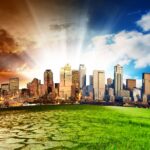Climate Change Case Studies Series
Climate change is an international phenomenon but its effects, including its impacts on human health, are local – often depending on geography, weather patterns, and a community’s resources and degree of resilience, including the historic and current-day consequences of racism.
August 24, 2021
As more and more Americans are experiencing the impacts of climate change, communities and governments are looking with greater urgency for ways to mitigate them and adapt.
This case studies series, a follow-on to the December 2020 TFAH/Johns Hopkins Bloomberg School of Public Health report, Climate Change & Health: Assessing State Preparedness, examines efforts by states and localities to conceptualize and implement climate change adaptation programs that are centered on equity.
Evidence shows that many communities most effected by climate change and its related health impacts are in that position due to environmental, social, and demographic factors. This series helps identify adaptation strategies that not only help to protect the health and safety of residents but do so in ways that contribute to a world in which every resident has the opportunity to be safe and healthy.
How do we achieve equity in climate change adaptation?
Achieving equity in climate change adaptation programs requires a fair distribution of the burdens of climate change as well as fair sharing of the benefits of adaptation programs including working to help remedy historic injustices.
Climate adaptation programs in California, Louisiana, Philadelphia, Boston, and Albuquerque are discussed.
Introduction to the Series (published August 2021)
Part 1 of the Series: Advancing Procedural Equity in Climate Adaptation (Published 2021)
Part 2 of the Series: Advancing Distributional Equity in Climate Adaptation (Published 2021)

